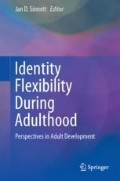Abstract
Research on identity development has focused primarily on the stages of adolescence and emerging adulthood. The focus of this chapter is on identity development during the middle adult years (ages 35–50), with an emphasis on those adults who have had relative success in establishing a meaningful sense of personal identity during earlier developmental stages. The challenges of the middle adult years that threaten eudaimonic well-being involve all domains and may include job burnout, the loss of a romantic partner through divorce or death, difficulties in maintaining religious or political idealism, and generational differences in ethnic identity expression. In order to maintain or restore eudaimonic functioning, identity flexibility entails finding new outlets for current skills and values either along established or new types of endeavors, identifying and development of new talents, and/or resetting priorities and improving time management skills to promote goal attainment. The predictors of successful use of identity flexibility will also be considered.
Access this chapter
Tax calculation will be finalised at checkout
Purchases are for personal use only
References
Ackrill, J. L. (1973). Aristotle’s ethics. London: Faber and Faber.
Aristotle. (4th Century B.C.E./1985). Nicomachean ethics. (T. Irwin, Trans.). Indianapolis, IN: Hackett.
Berzonsky, M. D. (1989). Identity style: Conceptualization and measurement. Journal of Adolescent Research, 4, 267–281.
Berzonsky, M. D. (2011). A social-cognitive perspective on identity construction. In S. J. Schwartz, K. Luyckx, & V. L. Vignoles (Eds.), Handbook of identity theory and research, Structures and processes (Vol. 1, pp. 55–76). New York: Springer.
Cooper, J. (1975). Reason and human good in Aristotle. Cambridge, MA: Harvard University Press.
Csikszentmihalyi, M. (1990). Flow: The psychology of optimal experience. New York: Harper & Row.
Ericsson, K. A. (1990). Peak performance and age: An examination of peak performance in sports. In P. B. Baltes & M. M. Baltes (Eds.), Successful aging: Perspectives from the behavioral sciences (pp. 164–196). New York: Cambridge University Press.
Erikson, E. H. (1963). Childhood and society (2nd ed.). New York: Norton.
Erikson, E. H. (1968). Identity: Youth and crisis. New York: Norton.
Erikson, E. H. (1982). The life cycle completed: A review. New York: Norton.
Haybron, D. (2008). The pursuit of unhappiness: The elusive psychology of well-being. New York: Oxford University Press.
Keyes, C. L. M., & Annas, J. (2009). Feeling good and functioning well: Distinctive concepts in ancient philosophy and contemporary science. Journal of Positive Psychology, 4, 197–201.
Kraut, R. (1979). Two conceptions of happiness. Philosophical Review, 87, 167–196.
Kroger, J., & Marcia, J. E. (2011). The identity statuses: Origins, meanings, and interpretations. In S. J. Schwartz, K. Luyckx, & V. L. Vignoles (Eds.), Handbook of identity theory and research, Structures and processes (Vol. 1, pp. 31–53). New York: Springer.
Marcia, J. E. (1966). Development and validation of ego identity status. Journal of Personality and Social Psychology, 3, 551–558.
Marcia, J. E. (1980). Identity in adolescence. In J. Adelson (Ed.), Handbook of adolescent psychology (pp. 159–186). New York: Wiley.
Marcia, J. E. (1993). The status of the statuses: Research review. In J. E. Marcia, A. S. Waterman, D. R. Matteson, S. L. Archer, & J. L. Orlofsky (Eds.), Ego identity: A handbook for psychosocial research (pp. 22–41). New York: Springer.
Marcia, J. E., Waterman, A. S., Matteson, D. R., Archer, S. L., & Orlofsky, J. L. (1993). Ego identity: A handbook for psychosocial research. New York: Springer.
Maslow, A. H. (1970). Motivation and personality (2nd ed.). New York: Harper and Row.
McDowell, J. (1980). The role of eudaimonia in Aristotle’s ethics. In A. O. Rorty (Ed.), Essays on Aristotle’s ethics (pp. 359–376). Berkeley, CA: University of California Press.
Norton, D. L. (1976). Personal destinies. Princeton, NJ: Princeton University Press.
Rasmussen, D. B. (1999). Human flourishing and the appeal to human nature. Social Philosophy and Policy, 16, 1–43.
Schulz, R., & Curnow, C. (1988). Peak performance and age among superathletes: Track and field, swimming, baseball, tennis, and golf. Journal of Gerontology, 43(5), 113–120.
Stephen, J., Fraser, E., & Marcia, J. E. (1992). Moratorium-achievement (MAMA) cycles in lifespan identity development: Value orientation and reasoning system. Journal of Adolescence, 15, 283–300.
Tatarkiewicz, W. (1976). Analysis of happiness. The Hague, Netherlands: Martinus Nijhoff.
Waterman, A. S. (1982). Identity development from adolescence to adulthood: An extension of theory and a review of research. Developmental Psychology, 1982, 342–358.
Waterman, A. S. (1990). Personal expressiveness: Philosophical and psychological foundations. Journal of Mind and Behavior, 11, 47–74.
Waterman, A. S. (1992). Identity as an aspect of optimal psychological functioning. In G. R. Adams, T. Gullota, & R. Montemayor (Eds.), Identity formation during adolescence. Advances in adolescent development (Vol. 4, pp. 50–72). Newbury Park, CA: Sage.
Waterman, A. S. (1993a). Finding something to do or someone to be: A eudaimonist perspective on identity formation. In J. Kroger (Ed.), Discussions on ego identity (pp. 147–167). Hillsdale, NJ: Lawrence Erlbaum.
Waterman, A. S. (1993b). Two conceptions of happiness: Contrasts of personal expressiveness (eudaimonia) and hedonic enjoyment. Journal of Personality and Social Psychology, 64, 678–691.
Waterman, A. S. (2011). Eudaimonic identity theory: Identity as self-discovery. In S. J. Schwartz, K. Luyckx, & V. L. Vignoles (Eds.), Handbook of identity theory and research, Structures and processes (Vol. 1, pp. 357–379). New York: Springer.
Waterman, A. S., & Schwartz, S. J. (2013). Eudaimonic identity theory. In A. S. Waterman (Ed.), The best within us: Positive psychology perspectives on eudaimona (pp. 99–118). Washington, DC: American Psychological Association.
Author information
Authors and Affiliations
Corresponding author
Editor information
Editors and Affiliations
Rights and permissions
Copyright information
© 2017 Springer International Publishing AG
About this chapter
Cite this chapter
Waterman, A.S. (2017). “Just When I Knew All of Life’s Answers, They Changed the Questions”: A Eudaimonist Perspective on Identity Flexibility During the Adult Years. In: Sinnott, J. (eds) Identity Flexibility During Adulthood. Springer, Cham. https://doi.org/10.1007/978-3-319-55658-1_21
Download citation
DOI: https://doi.org/10.1007/978-3-319-55658-1_21
Published:
Publisher Name: Springer, Cham
Print ISBN: 978-3-319-55656-7
Online ISBN: 978-3-319-55658-1
eBook Packages: Behavioral Science and PsychologyBehavioral Science and Psychology (R0)

